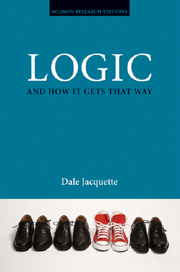Book contents
- Frontmatter
- Contents
- Preface
- Introduction: Logic, philosophy, analysis
- 1 Logical form
- 2 Monkey raisins
- 3 The secret life of truth-functions
- 4 Reference and identity
- 5 Intensional versus extensional logic and semantics
- 6 Truth
- 7 Logical and semantic paradoxes
- Conclusion: Moral lessons of logic
- Notes
- References
- Index
2 - Monkey raisins
- Frontmatter
- Contents
- Preface
- Introduction: Logic, philosophy, analysis
- 1 Logical form
- 2 Monkey raisins
- 3 The secret life of truth-functions
- 4 Reference and identity
- 5 Intensional versus extensional logic and semantics
- 6 Truth
- 7 Logical and semantic paradoxes
- Conclusion: Moral lessons of logic
- Notes
- References
- Index
Summary
AN EXPRESSIVE LIMITATION
It would appear that nothing should be easier in standard predicate-quantificational logic than to formalize a relation in which something stands to everything. The surprising fact is that the relation cannot be adequately symbolized for all predicates within the resources of classical logic.
This chapter offers a simple example of the problem and considers the possibilities for symbolizing the relation. The implication is that standard predicate-quantificational logic is inadequate to the task of representing all quantificational propositions. The question, then, if classical logic fails, is which system of non-classical logic to adopt in order to formalize all sentences with the same logical form. The object of the present chapter, accordingly, is not to settle definitively the question of exactly how to proceed in light of this acknowledgment, but merely to appreciate the limitations of classical logic and recognize the need for a non-classical alternative.
Far from proposing an excursion into primate scatology, as our title might suggest, the problem we shall address is the challenge of properly formalizing the sentence “Some monkey devours every raisin”. The inability of classical predicate-quantificational logic to deal adequately with this relatively simple colloquial sentence points toward inherent expressive limitations in standardly interpreted formalisms. As Socrates reminds his interlocutors in Plato's early aporetic dialogues, as true in philosophy of logic as it is in ethics, aporia, an unexpected state of puzzlement about something we thought we understood, the final stage of the Socratic elenchus or interrogative method of enquiry, is the first step on the path toward maieusis, or cognitive (and moral) self-improvement.
- Type
- Chapter
- Information
- Logic and How it Gets That Way , pp. 22 - 30Publisher: Acumen PublishingPrint publication year: 2010

